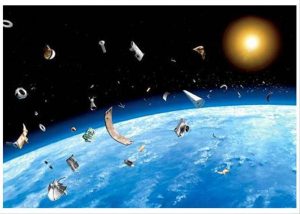At last year’s G-20 Summit in Osaka, the government announced measures to promote Japan’s name in space innovation. Japan has leapt at the opportunity to commercialize technology in the new experimental market of space garbage removal.
Even as humans struggle to clean up the environmental mess on Earth, there is growing space pollution hurtling around Earth. Earth’s orbit is increasingly crowded by inactive and defunct spacecraft and satellite parts, ranging from the size of a bus to nuts and bolts and specks of paint.
When pieces of debris collide, it sparks a chain reaction where fragments continue to collide with each other, breaking up into smaller and smaller pieces. The magnitude of man-made space debris is staggering. NASA is currently tracking 500,000 pieces between 1 and 10 centimeters in diameter. But the latest figures show there are 900,000 pieces debris ranging from 1 cm and 10 cm and 128 million fragments between one millimeter and one cm. There are also 5,000 satellites orbiting Earth, of which only 3,000 are active.
Competition in the satellite industry is heating up as tech companies such as SpaceX, Amazon, and OneWeb race to provide global internet coverage through the mass launch of satellites. But as space junk continues to clog orbit, the growing satellite industry faces an unpredictable future unless a solution can be found to remove abandoned space clutter.
Space pollution poses the risk of accidents, which could damage active satellites as well as the International Space Station. Space collisions in orbit also put human life and infrastructure on Earth at risk.
Japan hopes to cement itself as a space power and has developed a national space agenda showcasing three Japan-based private aerospace ventures. One of the selected space ventures is Astroscale, which specializes in space debris removal.
Japan’s Aerospace Exploration Agency (JAXA) has partnered with Astroscale to pull off the world’s first debris removal mission. JAXA’s Commercial Removal of Debris Demonstration (CRD2) project is made up of two stages aiming to collect a large fuselage originally from a Japanese rocket. The first stage will launch an experimental satellite in 2022 to collect data and inspect the fuselage.
Astroscale’s portfolio also consists of the ELSA-d mission self-described as “the world’s first commercial orbital debris removal.” The two-part 180 kilogram chaser satellite and 16 kg target satellite feature a magnetic docking mechanism and will stimulate a series of separation and capture maneuvers. Astroscale aims to test launch a demonstration on a Soyuz mission in the first half of 2020, aiming for commercialization by fiscal year 2025.
Astroscale, which was founded by a former Finance Ministry bureaucrat Mitsunobu Okada, has raised $102 million dollars, with a portion of funding coming from the Japanese government-backed Innovation Network Corporation Japan (INCJ). Astroscale was also awarded a $4.5 million dollar grant from the Tokyo Metropolitan Government to “set the roadmap for commercializing space debris removal.”
The concept of environmental sustainability has expanded to the realm of outer space, with the international community forging an approach to orbital sustainability. In February, Japan and the UN signed a joint statement pledging to raise awareness on space debris and to share research on removing space debris with the international community. Japan’s UN Ambassador Kimihiro Ishikane said “it’s the first time Japan will participate in a formal treaty concerning space trash, which has become a big problem.” He added, “Japan will leverage its long history with space trash and looks forward to cooperating.”

































